“A drop of water,Lucy Larcom
if it could write out its own history, would explain the universe to us.”
1st International Symposium of Design for Living with Water
3rd International Symposium of Design for Living with Water, will be held at the Faculty of Engineering and Architecture, Department of Interior Architecture, Beykent University in Istanbul, Turkiye from November 18 to 19, 2021.
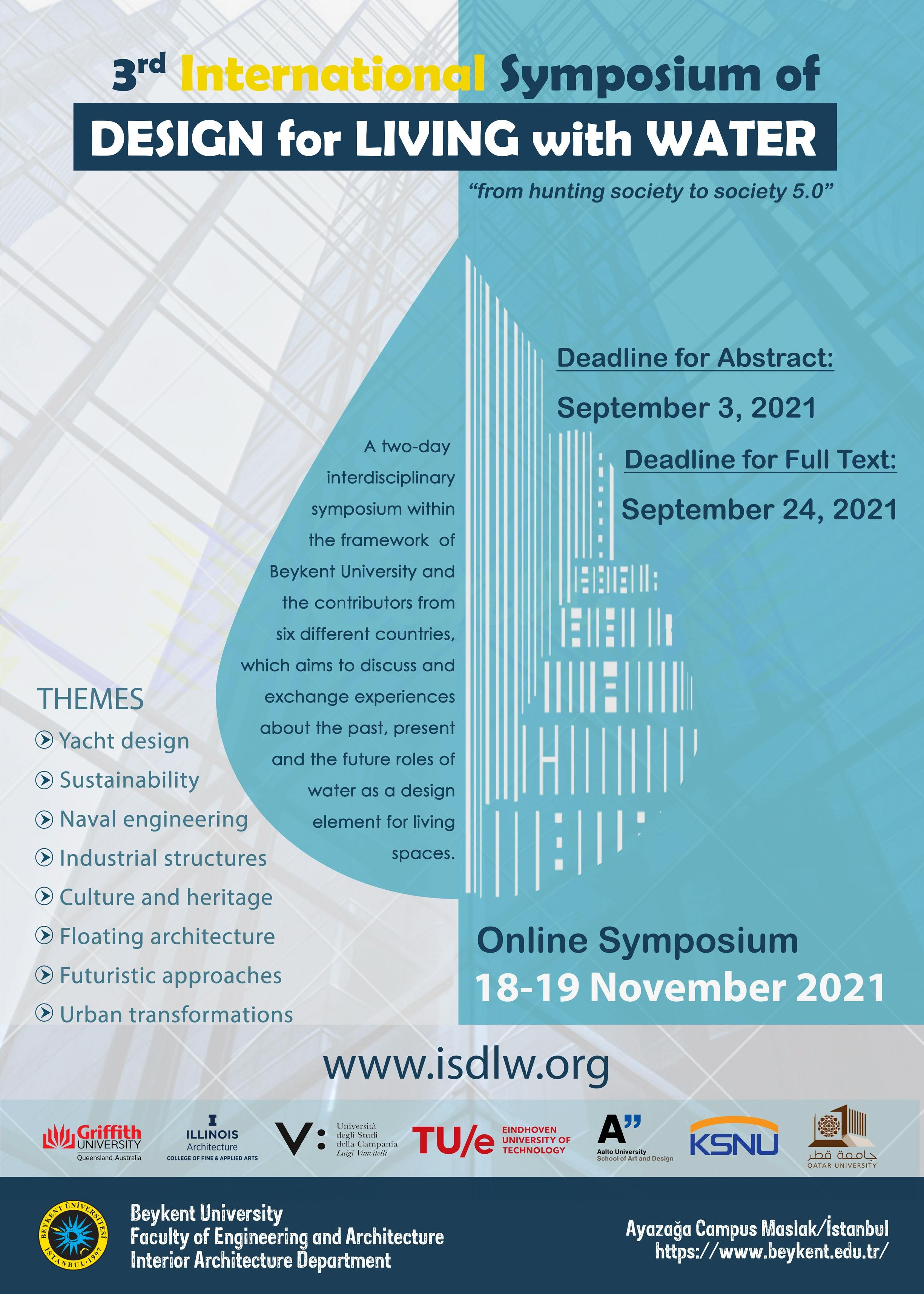
Water is the main life source for human beings starting from birth. Throughout the history, this vital element affected every field of life as well as the discipline of architecture and design, which have the mission to create comfortable and livable spaces for humans. It is observed that apart from alternative living spaces to terrestrial architecture in traditional forms, during the recent years, the studies which include the analysis as to space hotels, floating spaces and effects of spatial characteristics of pole stations on the users have increased. One of the reasons for this is that peoples need for alternative living spaces and resources has come up. The association of the concept of human-space-water is being considered together more frequently day by day.
In recent years, there is a growing focus on living with water due to extreme climate changes, rising density, economical trends, and sustainability problems. Scientists and futurists from all over the world are indicating the solutions for living with water and predict that the relationship between humans and water will increase. Not only the countries which have the risk of flood, or rising sea levels, but also the other countries which have the probability of effecting by the climate changes are taking into consideration water-based solutions. Also, the flow of capital and changing human lifestyle requirements show us water as an alternative living space.
Although the concept of living with water seems revolutionary, the human relation with water is not a new trend. In the scope of this symposium, different integration types of water to spaces from the vernacular models to floating homes will be discussed. As a response to the world’s sustainability problems, from both economical, socio-cultural, and also the ecological, we need to understand the importance of living with water. As the designers and engineers of the “climate change generation,” we have the responsibility to look at the past, present, and the future and ask the opportunities of water that we could apply, inform and transform to our designs.
We invite designers, architects, engineers, sociologists, students, and everyone who feels the need to create solutions sensitive to climate change and for the sustainable future of the world, particularly design with water.
Speakers
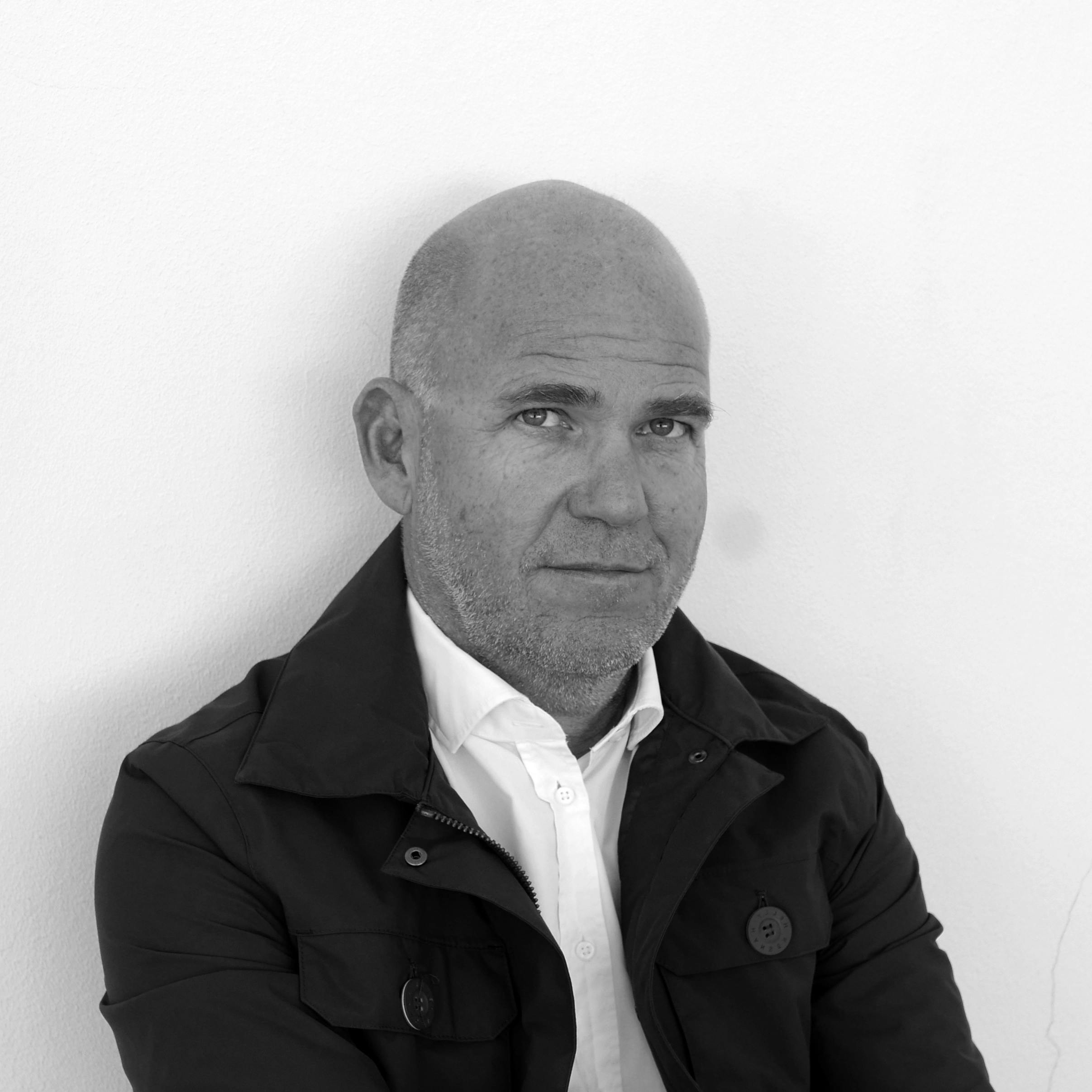
Prof. Dr. Joerg Baumeister
Prof. Dr.-Ing. Joerg Baumeister is leading the SeaCities Lab (SeaCities.org) at the Cities Research Institute, Griffith University in Australia which develops and implements water-adapted cities (aquacities) and floating structures (aquatecture). Its holistic research approach - that spans and includes the disciplines of engineering, architecture and environmental sciences - enables researches in the group to develop new approaches to building with and for nature, to create ecosystem-based developments that respond to the current challenges in an adaptive and compatible fashion. Joerg has been a practitioner, educator, and researcher for Architecture and Urban Design for more than 20 years throughout Europe, Africa, the Arabian Peninsula, Asia, and Australia. He is an award-winning architect and consults governmental institutions on the federal, state and regional level as well as NGOs and private industry leaders to apply his current research interests which comprise Ecological Cities, Affordable Housing in serial building technology, and Marine Design Innovation.
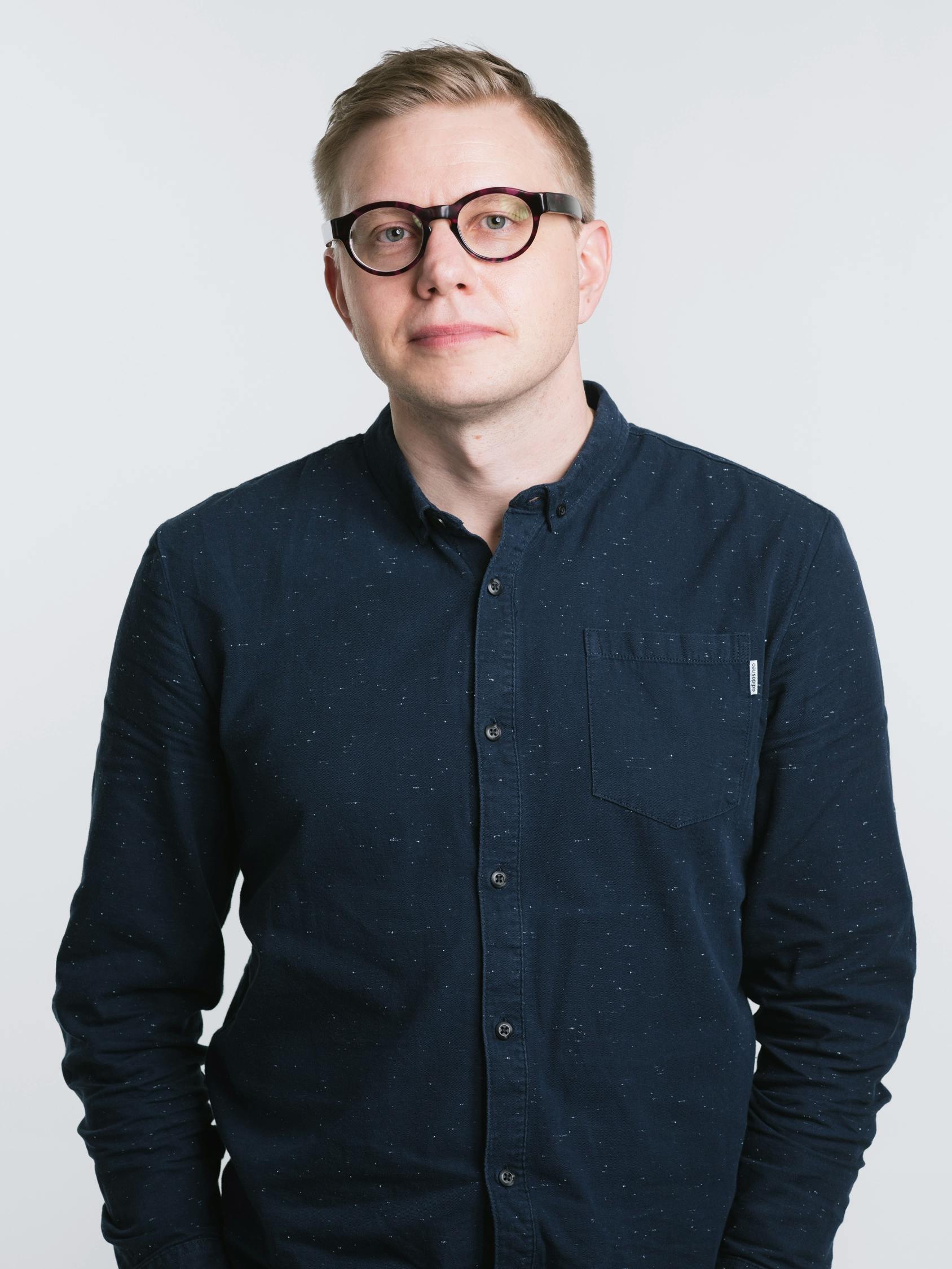
Dr. Markus Ahola
Experience Design for Living with Water Aalto University School of Arts, Design and Architecture Dr Markus Ahola’s interest area is user-centred design and designing for experiences. He has been applying these approaches to multiple applications such as magnetic resonance imaging, safety and ship design. He is an expert in multidisciplinary research project building and had a key role in the establishment of the Experience Research Society, Aalto Experience Platform and Aalto Cruise & Ferry Experience Program. He is an executive committee member and secretary of Experience Research Society and board member of SIGCHI Finland. Currently, he works on improving the accessibility and experience design of Magnetic Resonance Imaging technology.
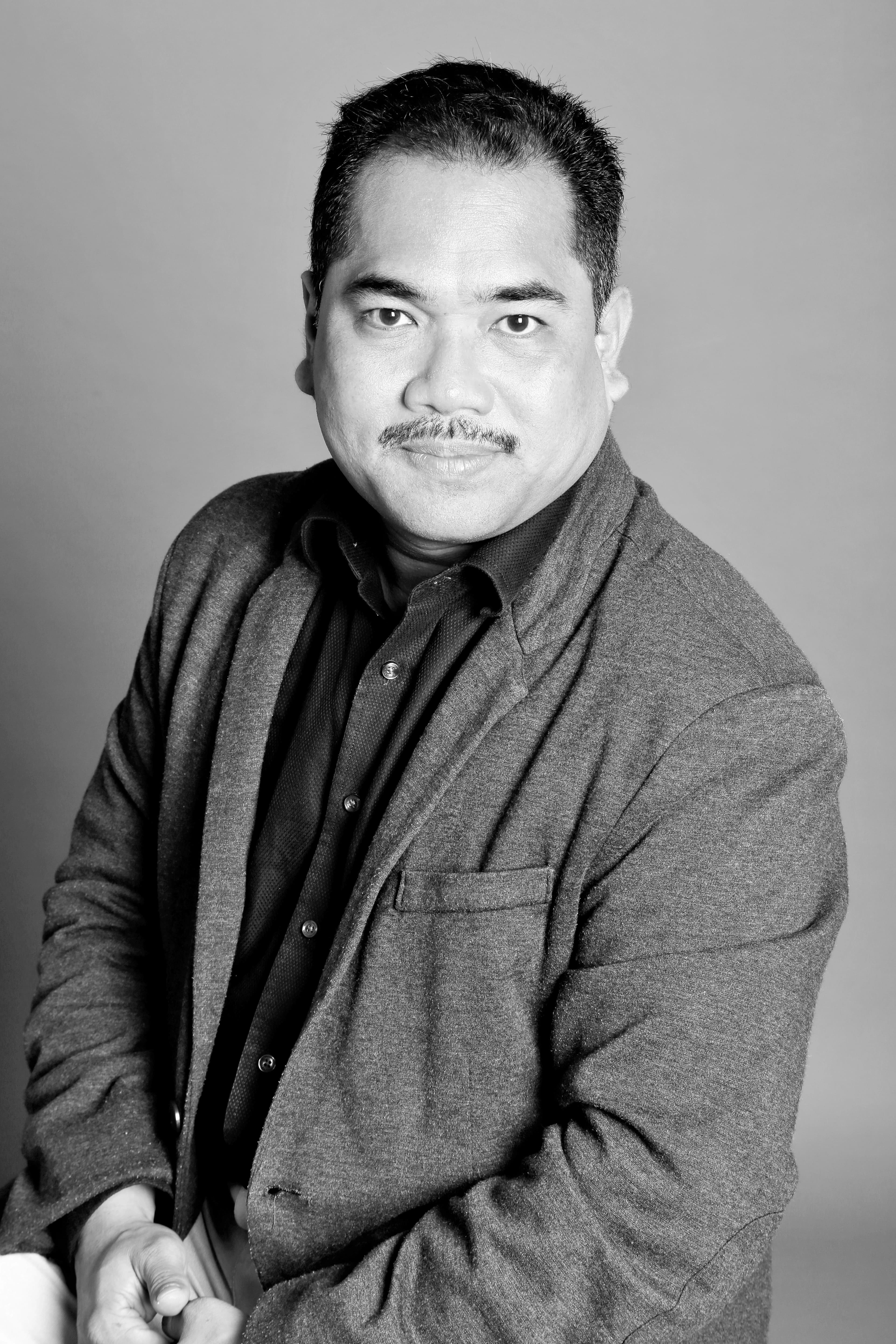
Assoc. Prof. Mohd Faris Khamidi
Dr. Faris is currently an Associate Professor in Architecture at Qatar University. He holds a PhD from Kyushu University, Japan, in the field of Architectural Engineering (2005) and completed a graduate certificate in Tertiary Education Management from LH Martin Institute, University of Melbourne (2016). He has more than 20 years of experience in applying sustainability concepts and principles to optimize building performance based on climatic conditions as well as enhancing building lifecycle, in particular reducing carbon footprint. Since 2012, Faris has developed his capability and competencies in Building Information Modelling (BIM) and Virtual and Digital Construction (VDC) with an emphasis on SMART Technologies. He is a Revit (BIM) certified professional by Autodesk in 2013. Faris was also the founding member and Deputy Director of Taiwan-Malaysia Construction Project Management and Digital Technologies International Centre [DiTIC] with Tamkang University from January 2018 – August 2019.
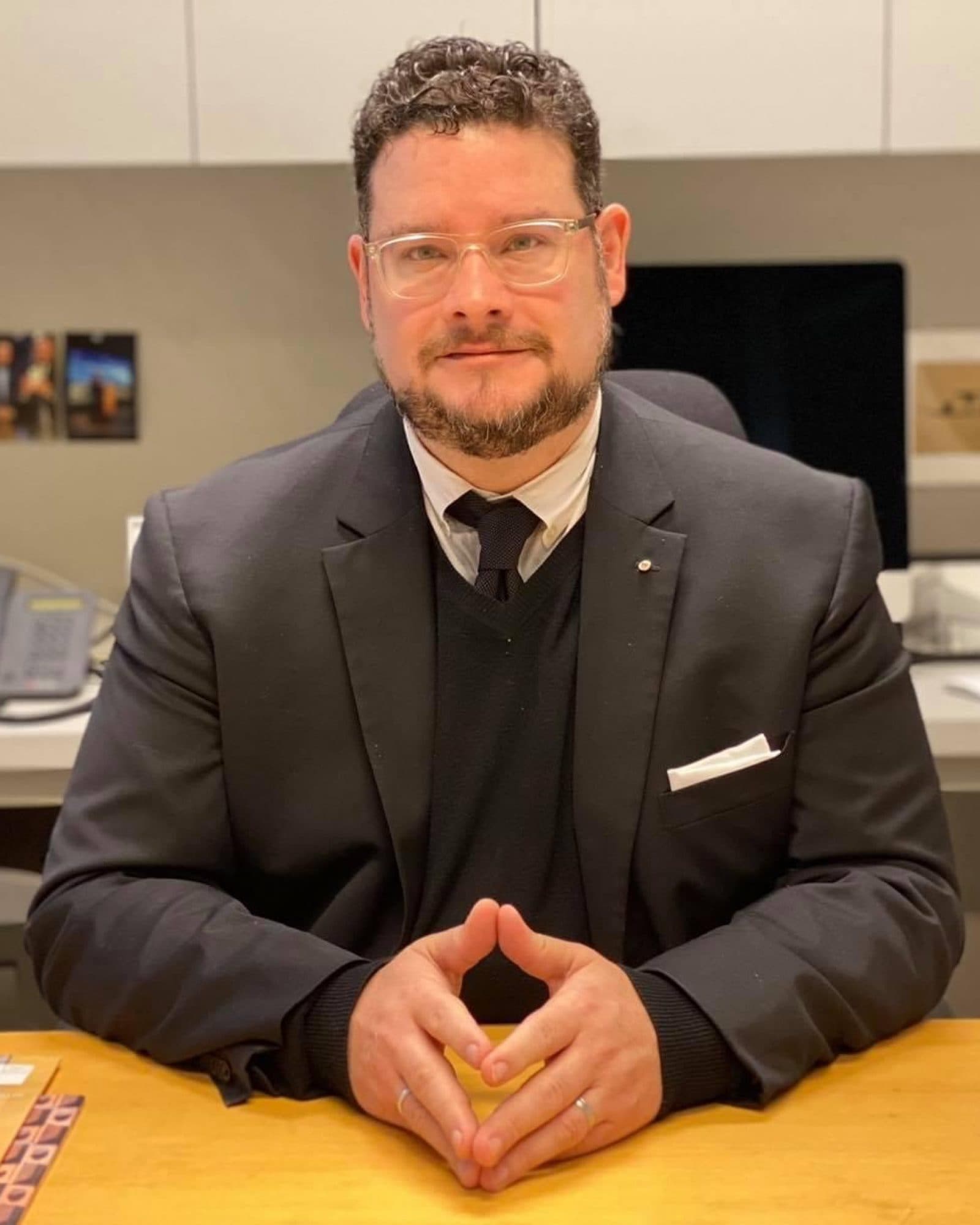
Prof. Francisco Javier Rodriguez-Suárez
"Water, Global Warming and Resiliency: another hurricane season in the Caribbean" University of Illinois School of Architecture Francisco Javier Rodríguez-Suárez, FAIA, is the Director of the School of Architecture at the University of Illinois at Urbana-Champaign. He studied architecture at Georgia Tech, the Université de Paris-Tolbiac, and Harvard GSD, where he earned a Master of Architecture with Distinction winning the AIA Medal and the Portfolio Award. After working for Machado-Silvetti in Boston, Rodríguez-Suárez returned to his hometown to work on a renovation of its historic district. For two decades, he taught at the Universidad de Puerto Rico, where he served as Dean for nine years. At UPR, Francisco directed (in)forma, an award-winning academic journal and edited five books including Alma Mater, Aula Magna, Chronologies of an Architectural Pedagogy, and Contemporary Architecture in Puerto Rico 1992-2010, a joint effort with the AIA.
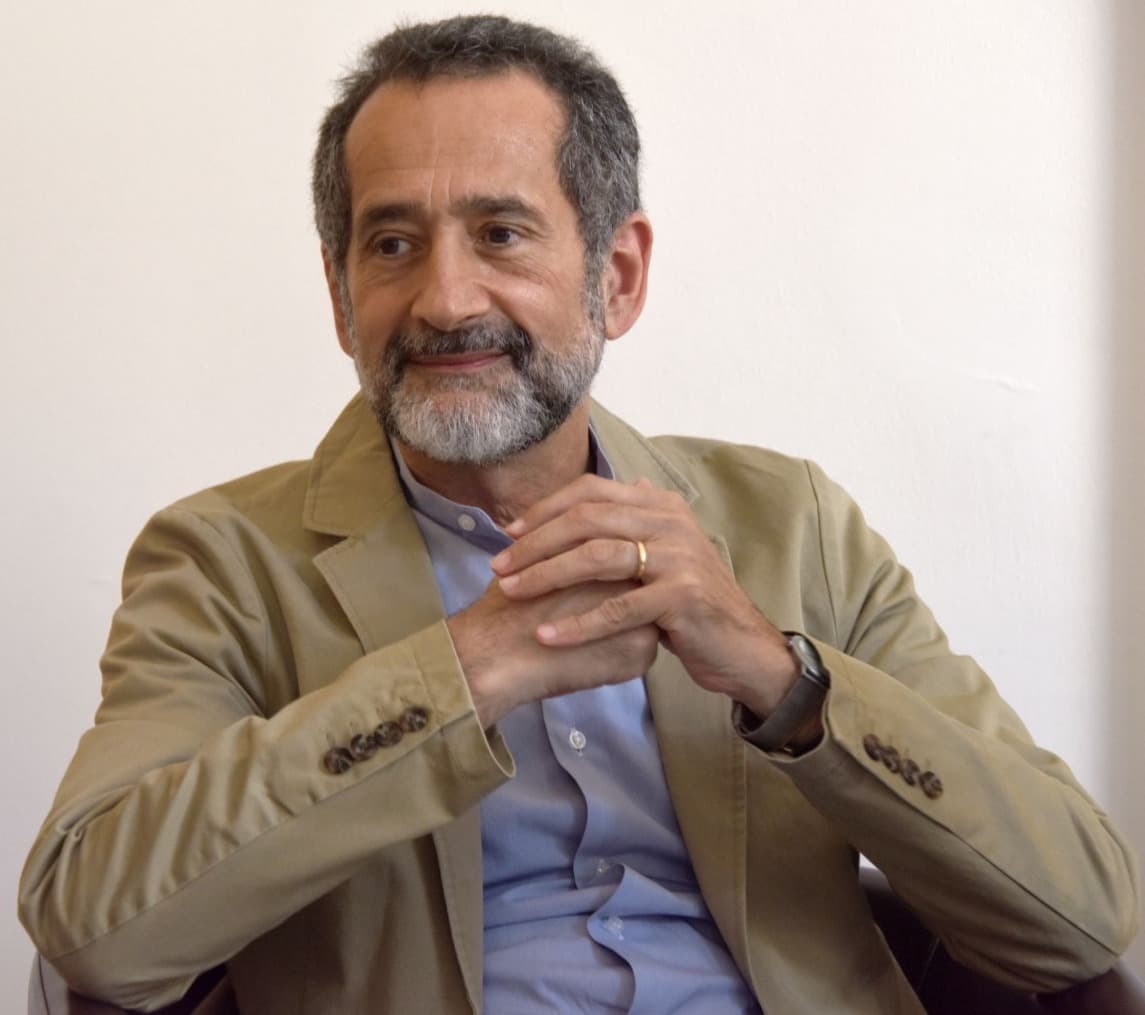
Prof. Arch. Claudio Gambardella
This is not a ... floating building, but a yacht. Reflections and Symbols about dwelling on water Claudio Gambardella, architect and designer, is Professor of Industrial Design at the Department of Architecture and Industrial Design (DADI) of the Campania University "Luigi Vanvitelli" (SUN) and he passed a public competition for recruitment as FULL professor (February 2021). He is a delegate of the Director for the Internationalization Policies of the Department.
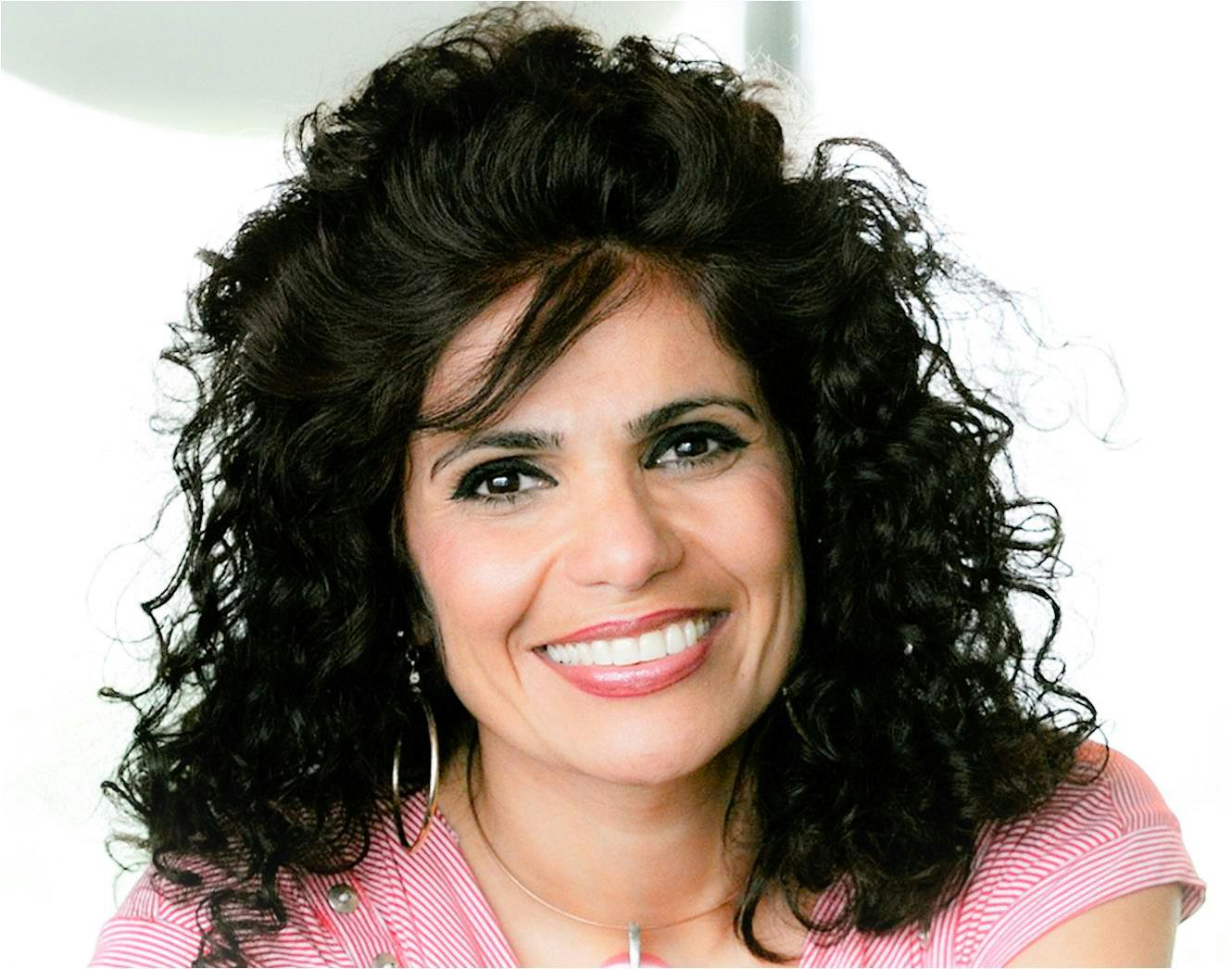
Prof. Dr. Masi Mohammadi
"Towards an Understanding Architecture: evolution of architecture through the embedding of emerging Technologies" Masi Mohammadi is the Leading Professor at the academy of Built Environment, HAN University of applied sciences, where she heads the research group Architecture in Health and a Full Professor of Smart Architectural Technologies at the Eindhoven University of Technology. As the principal investigator and leader of the research program ‘Empathic Living Environment’, an interdisciplinary study into the socio-spatial context of smart living, Mohammadi aims to develop a people-led framework for embedding emerging technologies in architecture.
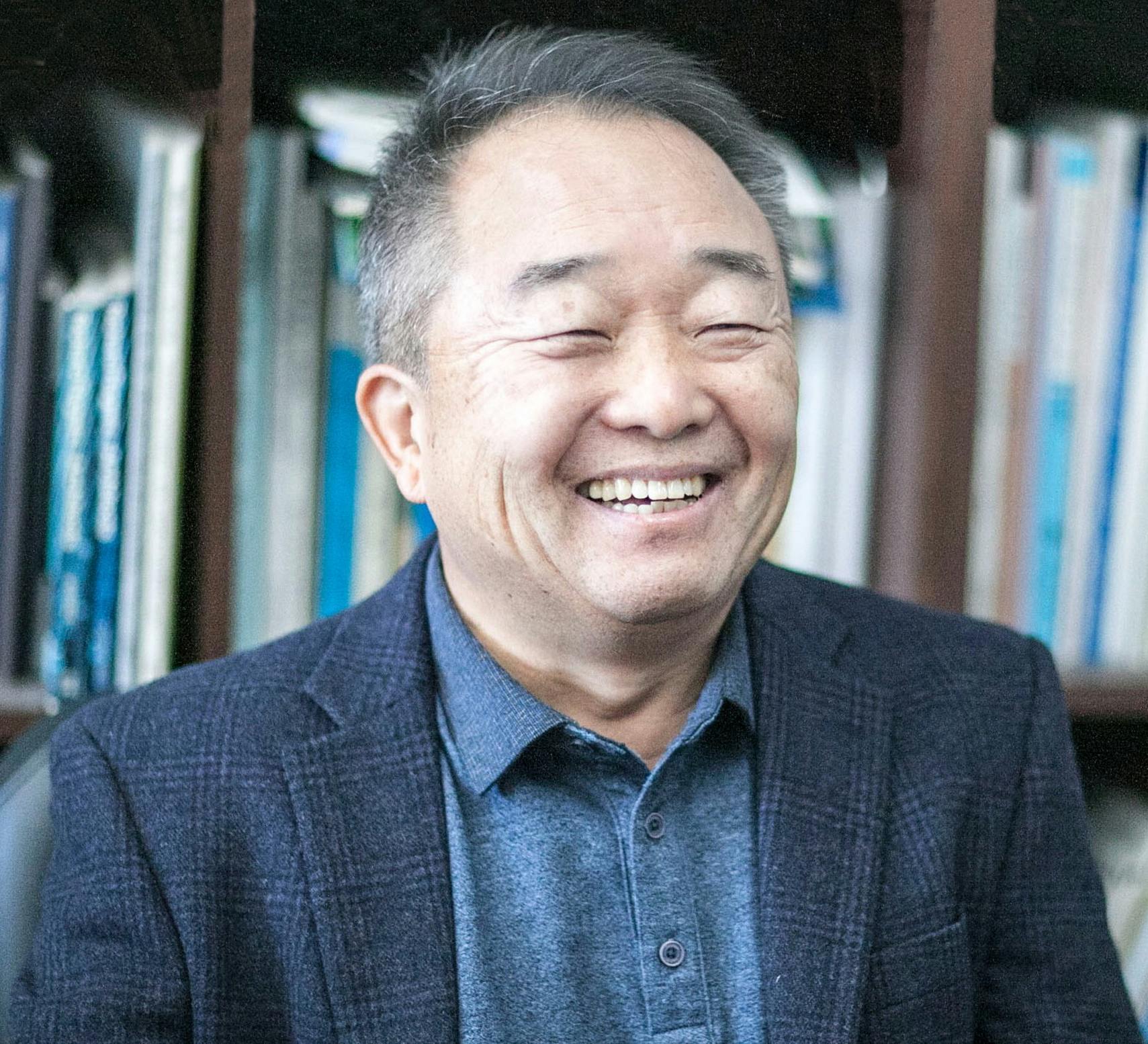
Prof. Changho Moon
Design Proposals of Modular Floating Parking Building for Archipelago Changho Moon, born in 1955, has been a professor since 1989 and is going to retire at the end of August 2021 in the department of architecture and building engineering, Kunsan National University, Korea. Also, he was a principal investigator of Floating Architecture Research Group, funded by the ministry of land, infrastructure and transport, Korean Government. Research period was about 5 years from December 2010. Around 15 professors from 3 Universities and 12 industries participated in the research. He wrote books “Floating Architecture as a New Building Paradigm” in 2015, and "Floating Architecture as a Sustainable Building” in 2021.
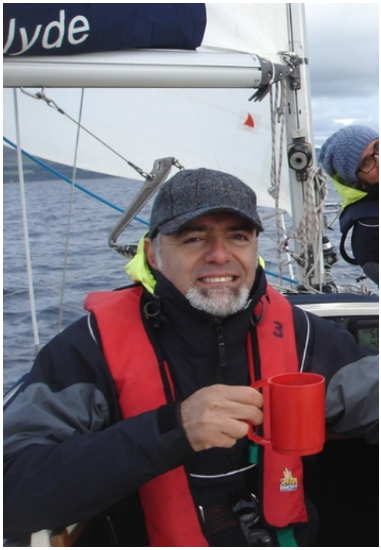
Prof. Dr. Gökdeniz Neşer
Prof. Neser from Dokuz Eylul University Institute of Marine Sciences and Technology’s Marine Technology Department is a naval architect graduated from Istanbul Technical University. He has carried on several research studies in the field of advanced polymer composites in marine use, including their degradation and recycling, and Life Cycle Assessment. Neser has published research on marine pollution issues, e.g. environmental and occupational impacts of the global ship recycling industry, environmental management of dredging, shipyards and ship repair facilities’ effects on the environment, oil pollution prevention funded by EU, UN, and national agencies.
Committees
Organizing Committee
- Prof Dr Alpay Er, Ozyegin University
- Prof Dr Ardeshir Mahdavi, Vienna Technical University
- Prof Dr Ayşe Uğur Tütengil, Beykent University
- Prof Dr Aytekin İşman, Sakarya University
- Prof Dr Burak Kaptan, Eskisehir Technical University
- Prof Dr Burçin Cem Arabacıoğlu, Mimar Sinan Fine Arts University
- Prof Dr Claudio Gambardella, Università degli Studi della Campania
- Prof Dr Çiğdem Polatoğlu, Yıldız Technical University
- Prof Dr Deniz Hasirci, Izmir University of Economics
- Prof Dr Ebru Çubukçu, Dokuz Eylül University
- Prof Dr Elmira Gür, Istanbul Technical University
- Prof Dr Fatih A. Rıfkı, Montana State University
- Prof Dr Hülya Turgut, Ozyegin University
- Prof Dr İbrahim Numan, FSMV University
- Prof Dr İlkay Masat Özdemir, Karadeniz Technical University
- Prof Dr Gökdeniz Neşer, Dokuz Eylül University
- Prof Dr Lerzan Aras, European University of Lefke
- Prof Dr Mehmet Emin Karahan, Beykent University
- Prof Dr Pelin Yıldız, Hacettepe University
- Prof Dr Rengin Zengel, Dokuz Eylul University
- Prof Dr Şengül Öymen Gür, Beykent University
- Prof Dr A. Tanju Gültekin, Rising University of Cyprus
- Assoc Prof Dr Alidost Ertuğrul, FSMV University
- Assoc Prof Dr Alexandrina Nenkova, University of Architecture Civil Eng.and Geodesy
- Assoc Prof Dr Burkay Pasin, Izmir University of Economics
- Assoc Prof Dr Cemil Atakara, Cyprus International University
- Assoc Prof Dr Ebru Erdogan, Selcuk University
- Assoc Prof Dr Emine Görgül, İstanbul Technical University
- Assoc Prof Dr Hikmet Sivri Gokmen, Dokuz Eylul University
- Assoc Prof Dr İnanç Işıl Yıldırım, Beykent University
- Assoc Prof Dr Mohammad Arif Kamal, Aligarh Muslim University
- Assoc Prof Dr Osman Demirbaş, Izmir University of Economics
- Assoc Prof Dr Rabia Kose Doğan, Selçuk University
- Assoc Prof Dr Tonguç Tokol, Marmara University
- Assoc Prof Dr Zeynep Tuna Ultav, Yaşar University
- Assoc Prof Dr Zihni Türkan, Near East University
- Assist Prof Dr Ahmet Fidan, Ordu University
- Assist Prof Dr Armağan Korkmaz, Michigan State University
- Assist Prof Dr Begüm Bayraktaroğlu, Beykent University
- Assist Prof Dr A. Can Özcan, Izmır University of Economics
- Assist Prof Dr Florina Jerliu, University of Prishtina
- Assist Prof Dr Lana Kudumovic, FSMV University
- Assist Prof Dr Leila Krivosic, International University of Sarajevo
- Assist Prof Dr Mehmet Aziz Goksel, Maltepe University
- Assist Prof Dr Nasiha Pozder, University of Sarajevo
- Assist Prof Dr Pelin Karacar, Istanbul Medipol University
- Ricardo Balbo, IED Istituto Europeo di Design Spa
Honorary President(s)
- Prof Dr A. Murat Ferman, Beykent University
- Prof Dr Şeyma Özkara Aydinoğlu, Beykent University
General Coordinator
- Assoc Prof Dr İnanç Işıl Yıldırım, Beykent University
- Assist Prof Dr Begüm Bayraktaroğlu, Beykent University
Symposium Programme
Themes
- Yacht design
- Sustainability
- Naval engineering
- Industrial structures
- Culture and heritage
- Floating architecture
- Futuristic approaches
- Urban transformations
Important Dates
- Abstract Submission October 2, 2020
- Full Paper Submission October 30, 2020
Venue
Beykent University
Ayazağa Campus Maslak/İstanbul
Ayazaga Mahallesi, Hadim Koruyolu Cd. No: 19, 34398 Sarıyer / İstanbul Location